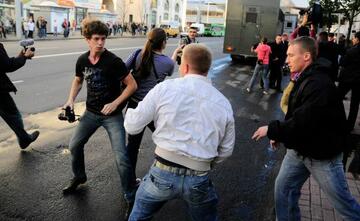
Foto credit: Index on Censorship, Belarus: Time for media Reform (2014). Creative Commons Attribution-NonCommercial-ShareAlike 3.0 Unported License.
Following the disputed Presidential elections in Belarus, we are deeply concerned by the torrent of attacks on media freedom that have followed. This includes evidence of journalists and media workers being attacked, arrested, detained or disappeared solely for doing their jobs. Democracy is more than free and fair elections alone; a free, open and independent media that report in the public interest and hold power to account guarantees both democracy and democratic processes such as elections.
Safety of journalists
Between 9 and 11 August, the Belarusian Association of Journalists (BAJ) has monitored at least 84 reports of media freedom violations against 62 Belarusian and foreign journalists or media workers. This includes 68 who have been detained, with 15 at the time of writing, still held in detention; 32 who were beaten, forced into detention or otherwise injured; 3 who were injured due to police attacks on protesters and at least 10 journalists and media workers who experienced threats of violence from security forces, which resulted in physical harm, damage to their journalistic equipment or the confiscation of equipment, including footage captured of the protests and police actions. Since the beginning of the official election campaign on 8 May, BAJ have recorded over 170 violations of media freedom.
It is deeply disturbing that a number of journalists and media workers including Znak.com journalist Nikita Telizhenko, investigative reporter Stas Ivashkevich, Meduza special correspondent Maxim Solopov, as well as Tatyana Belashova, Vladimir Lunev, Elena Shcherbinskaya, and Vitaly Dubik of Belsat, a Warsaw-based independent television channel were detained with their family, colleagues and legal representatives unclear as to their location. While Ivashkevich, Solopov and Telizhenko have subsequently been released, it remains unclear as to the location, status and wellbeing of the other disappeared journalists. Furthermore, according to Amnesty International and supported by BAJ’s analysis, a significant number of journalists include Usevalad Zarubin, Syarhei Hryts, Nadzeya Buzhan, Uladzislau Barysavich, Pavel Patapau and Ivan Murauyou were attacked or injured as a result of their journalistic work. The nature of these attacks differ. Verified footage shared from across Belarus show journalists and media workers being detained and forced into unmarked vans, with Nasha Niva journalist, Natalya Lubnevskaya, injured during the protests, when she was wounded by a rubber bullet fired by a police officer, which required hospitalisation. While many police officers or state security officers were clad in riot gear, a number were in plain clothes without formal identification when they detained journalists. This gave the appearance of abductions and further intimidated other media professionals and protesters.
This breakdown in due process and transparent policing, alongside the misuse of laws, including “destabilising the situation” to target media professionals entrenches impunity and undermines all principles of accountability. Every act of violence and unlawful detention requires robust, transparent and independent investigation to build public trust and enshrine the rule of law. Without this commitment, the democratic structures in Belarus will be diminished.
Access to free and impartial information
Beyond the attacks and detention of journalists and media workers, authorities also undermined the Belarusian peoples’ right to access free and impartial information when they blocked access to the internet, affecting websites and popular apps, including WhatsApp, YouTube, international media outlets and local media watchdogs and associations, including the Belarusian Association of Journalists (BAJ). According to NetBlocks, which tracks net freedom: “Outages increased in severity through the day [9th August] producing an information vacuum as citizens struggled to establish contact with the outside world. The incident continued until Wednesday morning with a recorded duration of 61 hours.” While the authorities blamed this on cyberattacks from foreign agents, a number of external and independent experts have confirmed this as an attempt to restrict public organising and a functioning independent press. Internet shutdowns violate international law, and reinforce the dangers faced by journalists and media workers who, due to the internet restrictions, were unable to reach emergency contacts, family members or their colleagues after being detained, attacked or arrested.
Joint calls
We, the undersigned organisations, urgently call on:
- the Belarusian authorities to ensure that attacks against journalists and media workers stop and everyone detained is released without delay;
- the Belarusian authorities to immediately end all internet disruptions and ensure access to a free and open internet and information;
- the Belarusian authorities to live up to their obligations to protect media freedom and the rule of law to ensure that their commitments to democracy are more than campaign promises;
- European institutions and the European community to use every diplomatic power at their disposal to ensure the people of Belarus, including all journalists and media workers, are protected and that the above-mentioned calls are fulfilled. This should include the reintroduction of commensurate sanctions related to allegations of electoral fraud, as well as all violations of media freedom;
- European institutions to scrutinise and reconsider EU financial support to state-controlled projects, as well as funding offered through multilateral development banks, without commitments to protect media freedom and the rule of law.
- European institutions and the European community to offer and strengthen practical and accessible support to threatened individuals, including journalists and media workers, such as safe passage, refuge and medical assistance where necessary.
Signed by
ARTICLE 19
European Centre for Press and Media Freedom (ECPMF)
European Federation of Journalists (EFJ)
Free Press Unlimited (FPU)
IFEX
IFEX-ALC
International Media Support (IMS)
International Press Institute (IPi)
Internews
Media Foundation for West Africa (MFWA)
Osservatorio Balcani e Caucaso Transeuropa (OBCT)
Palestinian Center for Development and Media Freedoms (MADA)
PEN America
Reporters Without Borders (RSF)
Rory Peck Trust (RPT)
Samir Kassir Foundation
Tags: Belarus Safety of journalists Media freedom
This content is part of the Media Freedom Rapid Response (MFRR), a Europe-wide mechanism which tracks, monitors and responds to violations of press and media freedom in EU Member States and Candidate Countries. The project is co-funded by the European Commission.


